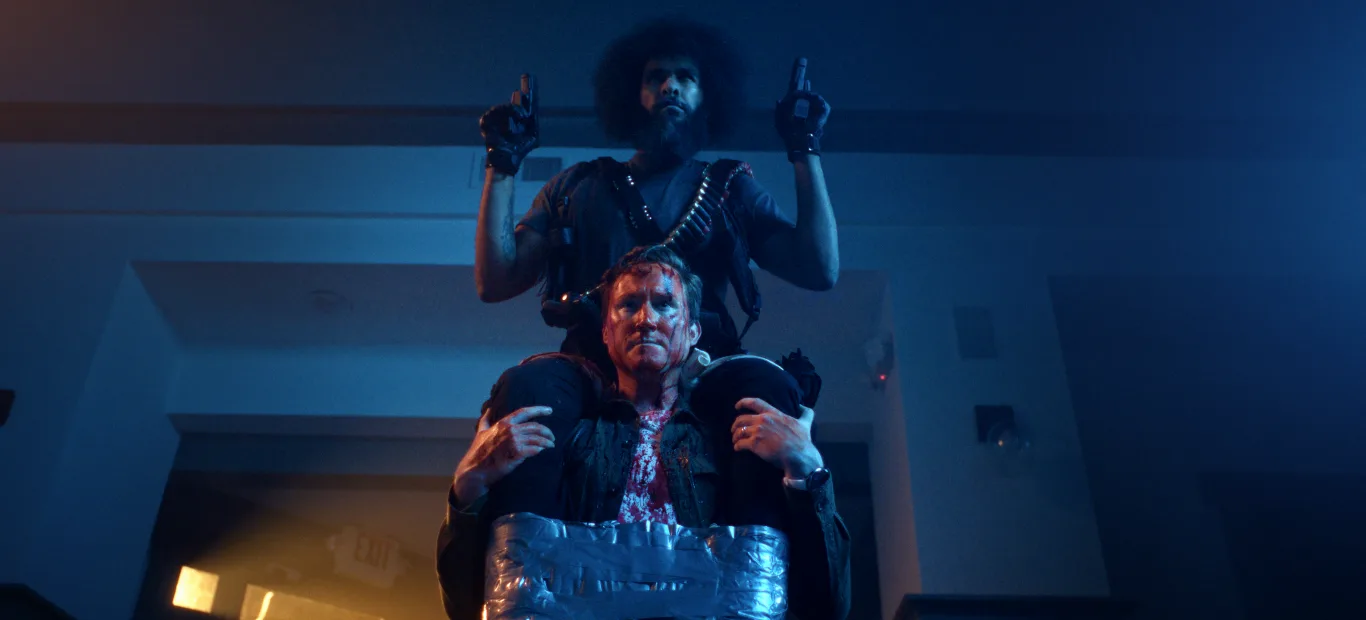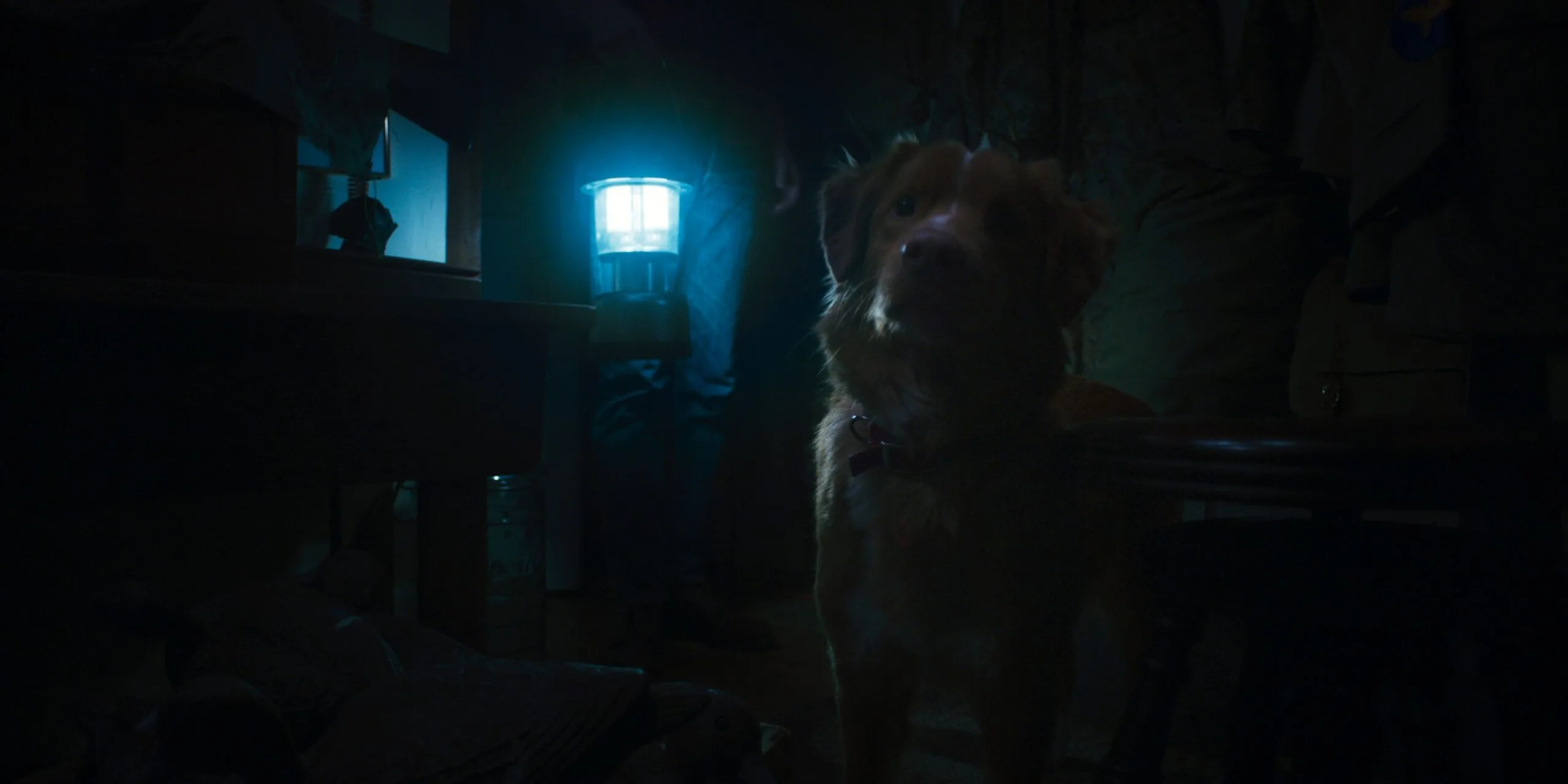As with many festivals, but especially Fantasia, a kind of analysis paralysis can creep in with even the most intrepid critic. What do you cover? What’s worth looking at and talking about? What can be paired together for snappy festival dispatches? Even (or especially) amid the Montreal-based fest’s genre brief, there’s a lot of variety to explore: animation, horror, science fiction, comedy, the list goes on. But even as I settle into my weeklong stint in Quebec (I don’t travel well), I find my curious pull for home calling to me in a trio of horror titles—two comedic, one compelling and mournful—about the pull to defend your domicile and the people in it.
First is Steve Pink’s “Terrestrial,” which feels at once like a bit of a stretch from prior films he’s penned and/or directed (“Hot Tub Time Machine,” “Grosse Point Blank”), and yet curiously in conversation with them. “Hot Tub,” of course, echoes in the ’90s-tinged TV adaptation of a fictionalized series of sci-fi novels called “The Neptune Files” that protagonist Allen (Jermaine Fowler) worships; Rob Corddry and Craig Robinson appear in the chintzy, low-budget clips we see. And the film’s curious intersection of showbiz ambition and frantic violence connects to similar concerns in “Grosse Pointe Blank.” This one doesn’t have the highs of the latter or the slapstick lows of the former, but it’s an interesting little psychological thriller that carries its own darkly comic streak.
Allen, you see, is a struggling sci-fi writer on the cusp of success. When his old college friends (James Morosini, Pauline Chalamet, Edy Modica) meet him at his new address in LA, they’re shocked to see it’s not a rinky-dink studio apartment, but a palatial mansion filled with “Neptune Files” memorabilia courtesy of the series’ author, SJ Purcell (“Ted Lasso”‘s Brendan Hunt). He’s about to hit paydirt, he tells them, as he’s just banked a massive advance on the new sci-fi novel he’s about to get published. But he seems weird, distracted even; his stories don’t seem to add up, he gets weirdly high-strung and disappears at odd moments. And the cracks in their long-dormant friend group dynamic—from financial woes to coveting engaged partners—start to grow ever deeper.
And then, about thirty minutes in, Pink throws in a real curveball, cutting back to three months earlier, and peeling back the curtain on Allen’s apparent Hollywood success story. This is where “Terrestrial” comes alive—similar to another great indie from this year, “Twinless,” which also sets up a status quo only to reveal nastier truths lying underneath. In this first stretch, Pink does an admirable job establishing the tension between his four characters; Fowler, for his part, plays anxious quite well, all evasive grins and measured cadence as he lies through gritted teeth and hopes he won’t get caught. Once the worm turns, and for spoilers’ sake we won’t get into specifics, the circumstances of Allen’s deceptions become clearer, and we follow him as he scrambles to put out one fire after another to keep the lie alive. It’s an entertaining bit of hopscotch farce.
There are moments where the infrastructure threatens to come crashing down—as more players enter the fray, or Allen’s friends struggle to follow the wrong trail of breadcrumbs to see what’s really going on with him. But Pink juggles the tension nicely, ramping up the pressure for Allen and the fragile dream he’s trying to will into existence through sheer determination. It ends in bloody, but fitting misery, “Terrestrial” understanding the high cost of lies, and the precarious footing success can put you on.

Now for something no less bloody, but a lot sillier: Writer/director William Bagley’s “Hold the Fort,” perhaps the only horror movie in existence to come away with a positive view on homeowners’ associations. That said, it comes in the form of a brisk and occasionally charming 75-minute horror comedy about the one context in which Stand Your Ground laws could potentially apply: When a horde of literal demons from hell descend on your neighborhood.
In this case, the HOA does a lot more than fine people for having the wrong grass or subtly gatekeep those who don’t properly assimilate into the white-picket-fence lifestyle: When new neighbors, aw-shucks marathon runner Lucas (Chris Mayers) and his skeptical wife Jenny (Haley Leary), show up for the “welcome to the neighborhood party,” they find a lot more there than awkward pleasantries and cucumber sandwiches. As wacky HOA prez Jerry (Julian Smith) explains, their suburb lies right next to a portal to the underworld, and one night each year the demons come out to play. Tonight’s that night, and Lucas and Jenny have to adjust quickly to a) realizing the supernatural world is real, and b) they’ll have to get along with their crazy new neighbors long enough to survive against witches, werewolves, and (long, drawn-out sigh) kung fu zombies. (Small price to pay for no property tax, though.)
For good and ill, “Hold the Fort” has big Feature-Length Cracked Video energy, leaning hard into big, broad laughs and over-the-top gore with the kind of devil-may-care glee you need for low-budget productions like this. Every few minutes, a new wrinkle or monster gets thrown at our characters (and us), and the cast scrambles to find the right solution in Jerry’s trunk of monster-hunting weapons (The HOA’s mantra? “Magic can’t stop bullets.”)
There’s a kind of infectious glee in how much fun the cast is having while making merry play with the genre, but the humor is a bit of an acquired taste. The gags and jokes are pretty pun-based and self-satisfied, the kind that winks a little too hard to make up for how creaky the joke was. The special effects have a distinctly After Effects flavor to them, making you feel like you’re watching kids create their first YouTube video. The performances are also no great shakes, which makes sense given that the script doesn’t give our characters much to do beyond spout gags and writhe in pain as they die. (Leary maintains a good head on her shoulders, though, and Smith’s Stifler-esque commitment is the most successful comic wavelength of any of the cast.)

With all that fun out of the way, it’s time for one of the best (and most devastating) horror movies out of the fest thus far: Ben Leonberg’s inventive, heartfelt “Good Boy.” The premise is deceptively simple and elegantly delivered: What if, when your dog stared at that random corner of your house, he really was seeing a ghost? That instinct, writ large, sets the tone for an unflinching haunted house tale of grief, all centered around the perspective of an unwell man’s best friend.
“Good Boy” is told entirely from the eyes of Indy (Leonberg’s own dog), a beautiful Nova Scotia Duck Tolling Retriever who remains fiercely loyal to his human, Todd (Shane Jensen). Leonberg keeps Todd’s face largely obscured, and our eye level right at Indy’s; we hear his voice, his raspy coughs that let us know something’s wrong, the worried phone calls with his sister as he uproots himself to the remote upstate home of his late grandfather (Larry Fessenden). Indy doesn’t know what’s going on. He just knows something’s wrong with his guy, and every so often, he sees a looming shadow in the corner of the house.
Over the next seventy-some minutes, “Good Boy” plays out its high concept in vivid, mournful fashion, as Indy plays witness to something akin to a family curse that’s cut short the lives of so many of the male members of Todd’s family (and seems to be affecting his human, too). Whether down to Leonberg’s mastery of the camera, or his innate knowledge of his furry friend, or both, he ekes out an outstanding performance from Indy—it’s abstracted, wordless (no narration here), told entirely through cocked heads, ear twitches, sniffs, and his big, expressive eyes. It’s a staggering pet performance, one so nuanced it’s hard to believe he didn’t know he was in a movie.
“Good Boy” largely rests on the novelty of that gimmick, but mines it for maximum pathos; as we spend more time in Indy’s world, chasing down the ghosts and spirits of the house that try to warn him of the trouble befalling Todd (including that of his grandfather’s own loyal companion, Bandit), Leonberg touches bittersweetly on the deep and abiding love a pet can have for his owner. Part of the film’s terror, especially as it reaches its heartbreaking conclusion, is watching this furry innocent see its entire world come slowly crashing down around it, and not being able to comprehend why. In that way, it so perfectly captures the rhythms of grief—the helplessness, the bargaining, the confusion—in ways that’ll leave you reaching for the tissues. It certainly knocked me for a loop when I saw it. A devastating, but profoundly rewarding start to the fest.
